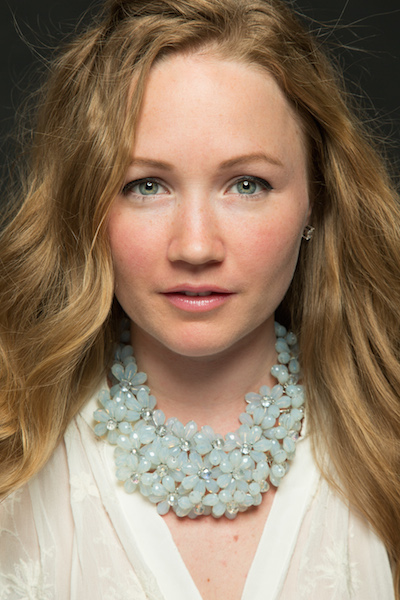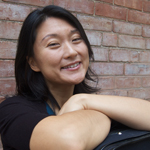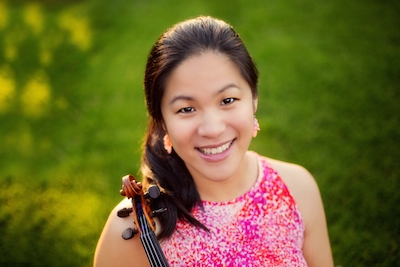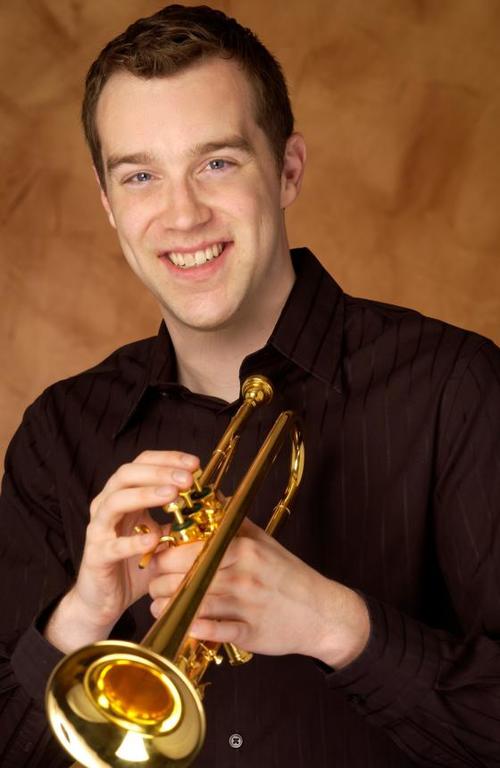This year, I once again invited four enterprising recent alumni of the Yale School of Music to speak to our students about how they created their career success, as well as to hear how they are navigating the possibilities and opportunities in today’s ever-changing world.
This year’s panel provided pithy insights and encouraging advice on how to create success in a variety of spheres, including freelance performing, teaching artistry, community engagement, university teaching and artistic collaborations. My students were most inspired to hear from these four stars:
 Cellist Ashley Bathgate pursues a successful freelance career as a touring soloist and chamber musician. Equally at home in the concert hall and the rock club, she is a member of Bang on a Can, Metropolis Ensemble and four chamber groups of which she is a founding member: TwoSense, Typical Music, Bonjour and the newly formed quintet, Samadhi. Ashley actively commissions new music and collaborates with many of today’s up and coming composers, including Brooklyn-based composer collective Sleeping Giant, Ted Hearne, Todd Reynolds, and Fay Wang.
Cellist Ashley Bathgate pursues a successful freelance career as a touring soloist and chamber musician. Equally at home in the concert hall and the rock club, she is a member of Bang on a Can, Metropolis Ensemble and four chamber groups of which she is a founding member: TwoSense, Typical Music, Bonjour and the newly formed quintet, Samadhi. Ashley actively commissions new music and collaborates with many of today’s up and coming composers, including Brooklyn-based composer collective Sleeping Giant, Ted Hearne, Todd Reynolds, and Fay Wang.
 Violinist Tina Hadari is the founder of New Haven-based Music Haven and founding violinist of the Haven String Quartet. Tina has combined her passions for chamber music, urban music education, and community service to create an ensemble dedicated to public service. Tina has also performed to critical acclaim as a soloist and chamber musician in halls worldwide.
Violinist Tina Hadari is the founder of New Haven-based Music Haven and founding violinist of the Haven String Quartet. Tina has combined her passions for chamber music, urban music education, and community service to create an ensemble dedicated to public service. Tina has also performed to critical acclaim as a soloist and chamber musician in halls worldwide.
 Sarita Kwok is the Chair, Department of Music, Associate Professor of Music and Artist-In-Residence at Gordon College, a position she assumed 5 months ago. She heads a department of 70 students, full-time and adjunct faculty, handles development and alumni relations, runs a concert series, plans curricula and will teach next semester. Sarita is an enthusiastic and committed chamber musician who actively collaborates with pianist Wei-Yi Yang and her husband, Boston Symphony cellist Alexandre Lecarme. A member of the Arabella Quartet, she is also an artist member of Mistral Music of Boston. Sarita was the founding first violinist of the Alianza Quartet, the former graduate quartet-in-residence at Yale University and spent 8 years on the faculty of Yale’s Department of Music.
Sarita Kwok is the Chair, Department of Music, Associate Professor of Music and Artist-In-Residence at Gordon College, a position she assumed 5 months ago. She heads a department of 70 students, full-time and adjunct faculty, handles development and alumni relations, runs a concert series, plans curricula and will teach next semester. Sarita is an enthusiastic and committed chamber musician who actively collaborates with pianist Wei-Yi Yang and her husband, Boston Symphony cellist Alexandre Lecarme. A member of the Arabella Quartet, she is also an artist member of Mistral Music of Boston. Sarita was the founding first violinist of the Alianza Quartet, the former graduate quartet-in-residence at Yale University and spent 8 years on the faculty of Yale’s Department of Music.
 Paul Murphy is a freelance trumpeter and teaching artist with the New York Philharmonic, as well as the co-founder and member of Decoda, the alumni group of the Academy/Ensemble ACJW. Paul is passionate about drawing audiences deeply into the art of music. As a chamber musician, and orchestral player, he has performed in hundreds of cities and 18 countries throughout Asia, Europe, and the Americas. He has also performed with the Orpheus Chamber Orchestra, the International Contemporary Ensemble, the Orchestra of St. Luke’s, the American Symphony Orchestra, the Radio City Orchestra and the New York Pops. You can follow Paul on his blog at onemusicalcitizen.com.
Paul Murphy is a freelance trumpeter and teaching artist with the New York Philharmonic, as well as the co-founder and member of Decoda, the alumni group of the Academy/Ensemble ACJW. Paul is passionate about drawing audiences deeply into the art of music. As a chamber musician, and orchestral player, he has performed in hundreds of cities and 18 countries throughout Asia, Europe, and the Americas. He has also performed with the Orpheus Chamber Orchestra, the International Contemporary Ensemble, the Orchestra of St. Luke’s, the American Symphony Orchestra, the Radio City Orchestra and the New York Pops. You can follow Paul on his blog at onemusicalcitizen.com.
Early Years and Evolving Career Paths
Our panelists shared about their time at Yale and how their careers have evolved over the years. It was fascinating to hear that none of them had a plan for what to do after graduating and that their career paths took interesting twists and turns as they pursued various opportunities.
Tina took a few years off between undergraduate studies and Yale and discovered her love of urban music education and community work. While at Yale, she formed a string quartet but said that she had no idea of what she wanted to do after graduation in 2004. Her quartet applied for and was accepted to a 3-year residency in Boulder, Colorado with the Takács Quartet. However, when she received a call to come back to New Haven and begin a community music program, she knew that this was what she wanted to do because it combined her love of chamber music, urban education and community service. Tina returned to New Haven and founded Music Haven 9 years ago with the mission of making chamber music a part of the community. From a small string quartet without a space in which to perform, Music Haven now teaches 80 students, has a budget of $500,000, performs in a converted garage space and is a significant contributor to the families and residents of this community. Because the organization is on such solid ground, Tina has made the difficult decision to leave Music Haven at the end of the fiscal year.
Paul came to Yale after attending St. Olaf’s College in Minnesota where he initially was not a music major. As a result, he felt behind the curve when he arrived at Yale. Paul expressed that he had no idea of what he wanted to do after graduation, commenting that playing with Orpheus as a freelancer in NY was simply not on his radar. Being uncertain allowed him to meander. He won a job with an Asian orchestra after graduating from Yale in 2006 but after selling his possessions and moving to Korea, the job fell through after one month and he returned home to Kansas. He was fortunate that the Ensemble ACJW Academy had just started up and he was accepted to the first class of Fellows of the ensemble. His current career grew directly out of his Academy experience: His work as a teaching artist with the New York Philharmonic is fulfilling and financially sustainable; he actively freelances; and he has developed entrepreneurial and leadership skills as a co-founder of Decoda, putting great musical art in the service of the community, from Carnegie Hall to prisons. Paul was proud to report that Decoda has been appointed as the first ever affiliate ensemble at Carnegie Hall. After three years, Paul is now transitioning away from the day-to-day leadership of Decoda and is looking forward to bringing his own projects to the organization in the future.
Ashley came to Yale to study the traditional repertoire and had no plan of what to do next. Thanks to a suggestion from Martin Bresnick, the head of YSM’s composition faculty, she auditioned to be the cellist for Bang on a Can and won the job after a delightful audition where she played with the ensemble for an hour, rather than playing a series of excerpts. So off she went to New York after graduating in 2008 and that changed everything for her. Joining Bang renewed her love of music and made her realize how much she loved performing new work. She also was inspired to begin commissioning music from her contemporaries, as well as start her own ensembles. Ashley credits her classical training as the reason for winning the job with Bang on a Can because she worked incredibly hard to be a good cellist. Moreover, her work in new music also informs the way she plays more traditional music so the two are linked and make her a more well-rounded musician. Ashley indicated that she loves her life as a touring freelancer and that she is beginning to reflect on her life a bit so that she is pulling back a bit.
Sarita came to Yale to pursue her doctorate. She too reported that her targets were “ambiguous” when she was at Yale. She wanted variety and was grateful to her mentors at Yale for helping her to forge her path:
- The Toyko String Quartet, who stood behind and invested in the success of her student quartet while the quartet was in residence at Yale;
- Professor Syoko Aki, her teacher, who mentored her as a violinist;
- Professors Michael Friedman, Dan Harrison and Ian Quinn (for whom she was a teaching assistant), all of whom encouraged her teaching path;
- Dean Robert Blocker, who saw her potential as a leader and helped her to develop leadership and administrative experience.
She was lucky to be offered an appointment in Yale’s Department of Music, as well as her role at the School of Music directing the Yale undergraduate lessons program and alumni relations. Sarita shared that her last class at Yale last year was so spectacular that she knew it was time to move on. At Gordon, she is able to combine all four of her passions since her position enables her to serve as an educator, a committed violinist, an active chamber musician and an arts leader.
Community Engagement
Since each of our panelists are deeply committed to education and community work, our students were eager to know more about how to gain a foothold in the field of community engagement.
Defining community engagement as “drawing people into the art of music”, Paul felt that it was a hard field to break into and recommended finding a mentor.
Tina made the point that community engagement requires playing the long game. One night at a concert with an outstanding artist can be thrilling but Music Haven’s approach is to build a program over a long period of time in order to solidify the relationship with the community. She also related some of the challenges that her students face living in two different worlds. One of her students whom she has taught for 9 years and is now in 10th grade, who recently asked if his quartet was ready to play Beethoven’s Op. 135! At the same time, this young man experiences discrimination based on the fact that he is from a lower-income neighborhood and is not made to feel welcome in wealthier neighborhoods.
Sarita echoed that community engagement requires music education from an early age and involves a long-term investment. At Gordon, more than 50% of the students are music education majors. Sarita felt that there has long been a great divide between education and performance. Thus, we must educate the future generations of students because it is the day-to-day contact with a teacher who can inspire you to make and love music. Otherwise, “we can forget about performance.”
Forming An Ensemble
Another student question concerned how to form an ensemble. All four panelists said that they wished they had had an entrepreneurship class while at Yale because they had to figure things out on their own.
Ashley–who has started 4 ensembles and fundraises for projects—emphasized the importance of having a sense of business and reported that she “fumbles through” and “learns on the go”. She urged our students to take the time while at school to gain these skills, as well as build a community of relationships with peers since she often collaborates with her Yale peers. She also mentioned that “two heads are better than one” and that having a community makes things a lot easier. While it may be tempting to think that you can play and compose and fundraise and do the PR and marketing and manage the event on your own, the most successful enterprises are teams. She urged our students to collaborate with people who are good at social media, fundraising and PR.
Paul shared that your passion drives you through a lot of your blind spots and encouraged our students to “just go for it and don’t be afraid to make mistakes.” This, of course, is the polar opposite of how you are trained to make music and can be quite scary but you have to take the risks. Decoda is comprised of 30 people who care a lot about the organization and collectively have worked together to overcome initial challenges, including having to change the original name of the organization right after they began to publicize the ensemble and fundraise! He also emphasized the importance of getting everyone on the same page, knowing who is good at what and recruiting people with the skills you need to fill in any gaps.
Tina also mentioned the importance of “getting the right people on the bus” with whom to pursue a long-term endeavor. When she founded Music Haven, she had no administrative experience so it was crucial for her to find good mentors. She reiterated the importance of not being afraid to make mistakes:
“That’s what being an artist is all about! If you can go out in front of a panel and compete for a job, you can go and ask people for support! They may say no but you have all experienced rejection. It’s the same thing. Musicians are good at managing rejection!”
Paul echoed that “failing well” is an essential life skill. And Sarita made the point that musicians are good at persevering. Her advice? Ask. Find a team. You can build a healthy culture by building a healthy team.
Classical Music in Today’s Culture
We then embarked on a discussion of what is required for classical music to take hold in our culture at a time when positions with organizations that have traditionally hired Yale musicians, like the symphony orchestra and institutions of higher education, are difficult to come by and not necessarily secure and high-paying.
Paul has been surprised that jobs once considered stable – even tenured symphony orchestra positions – are increasingly under pressure and may be facing major changes in the coming years. Musicians in Detroit, Minnesota, Atlanta, and elsewhere have had to scramble for work during periods of pro-longed lockouts that would have been unthinkable even a few years ago. Paul emphasized that despite this, he feels strongly that art and music are not going away and will in fact thrive if arts organizations can remain flexible and engaged with the communities that they serve. While classical music is rooted in an elite culture, it is amazing art form and will survive long into the future. His advice was to look for growth in the ecosystem and to marry performance with education in order to open the art form to a bigger audience.
Ashley observed that the bottom falling out is one of the best things that has happened to the field because organizations have to restructure in order to succeed. Albany Symphony’s Music Director David Alan Miller has observed that orchestras may have to change the way they hire in order to attract a new kind of musician. Ashley also cited that New York Philharmonic’s Biennial where Bang on a Can was invited to participate for the first time! Furthermore, she noted that in her DIY generation, musicians are starting their own ensembles, series and programs and having access to new venues like Le Poisson Rouge and The Stone. There is an opportunity to create a rumble because you can concertize anywhere.
Tina weighed in on the question of how her work contributes to the sustainability of the field. Her mantra is to find the nexus between passion for music and the arts together with a contribution to society. She also emphasized the need to create the demand for that contribution, which may take years and is worth the investment of time.
Sarita emphasized the importance of sharing, contributing and going outside yourself. Classical music can be very self-absorbing so it is critical to think about what the audience needs and what you can contribute to them.
Today’s Audiences
All four panelists shared the view that today’s audiences are looking for a personal connection to the music by finding the point of connection with the person who is playing and understanding the personal reason for why the musician is engaged in his or her art.
Tina tells her older students that if you go on stage to perform and you don’t feel that you can compete with the blockbuster movie down the street, you should not go on stage. Your performance should create a story and a connection. Audiences are looking for connection and a story, as well as your story.
Ashley felt that because people will come—and come back– to see an artist who is genuine and who stands behind her work and what she does. She urged our students to use the time in school to think about what they do and why they do it because when you can answer these questions, you can choose the right programs and communicate your passion to the audiences. This also involves knowing your brand and having the right package as an artist.
Paul observed that any time a person has a personal experience with art, it deepens the connection. He is not sure that people know what they want, citing Steve Jobs whose mantra was to give people what they don’t know they want. That’s a much tougher job. You have to think like a real artist. Be ahead of the curve. “Rope people in and then be genuine!!!
Marketing and Social Media
This led to a discussion of marketing and social media which our panelists felt provided valuable tools—and free to boot! Thus, you can share video trailers for concerts and 30 second sounds bites to whet people’s appetites and generate excitement. Kickstarter and personalized emails with short musical excerpts are also useful. Ashley advised students to have a hook and then market it.
Paul indicated that Decoda partners with other organizations that already have a captive audience so they sell tickets for the ensemble. He also indicated that many of Decoda’s projects are funded by grants and that ticket sales alone are not enough to sustain the organization.
In terms of how much to share about yourself on social media, all four panelists agreed that it was important to be genuine, to keep details of your private life to yourself and not to have 2 distinct personae since that it much too hard to manage!
Life Balance
Inasmuch as two of our panelists (Tina and Sarita) have children and three (Tina, Paul and Ashley) mentioned that they are going through a period of reflection, our students were eager to know how they balanced their personal and professional lives.
All four panelists emphasized that life has different chapters so that balance and priorities change throughout your life.
Tina reflected that sustainability is about trying to adapt and figure out how to prioritize. It will be different at various points in your life.
Paul, who is considering going for another degree after three years of helping to lead Decoda, and who also wants a family at some point, feels that you can do everything but not at the same time.
Ashley is thriving as a freelancer but is also in a period of reflection in order to have more balance between her personal and professional lives. She advised our students to “go for it now when you have a lot of energy”, as well as to master time management.
Sarita said that in the last 5 months, she has thrown herself into her new job and does not have balance! However, she sets clear boundaries and protects her time, both in her professional and personal spheres. She also urged being mindful so that when you practice, concentrate on what you are doing and don’t think about other things.
Making a Living as a Musician
We then embarked on the practical aspects of making a living as a musician.
One challenge is knowing which opportunities to accept and which to turn down. The panelists all felt that it was a matter of trial and error before you could figure out the difference between a good opportunity and a great one. One filter is to evaluate prospective opportunities in terms of:
- Money
- Relationships
- Career Advancement
- Personal Satisfaction
Since freelancers have unpredictable income, it is tempting to say yes to all paying gigs in order to cover expenses but eventually, that can “kill your energy”. When first starting out, it may therefore make sense to find an easy non-musical job. Ashley is at the point where she has a fee below which she will not go. While this runs the risk of rejection, in her experience, presenters may initially turn down her request but then they return and meet her fee. Management can be helpful to negotiate the fees. And there may times when it is appropriate to donate one’s services in order to be generous to a cause that you believe in.
Final Words of Advice:
Paul:
Follow your passion.
Don’t be afraid to fail.
Be really good.
Things are changing and the world needs more musicians so I am really excited for you to get out into the field. Youth is a great change agent. While the answers are not clear, I feel that small organizations are going to emerge as the successful models for classical music.
Sarita:
Work hard.
Be discerning about what you do.
Don’t be afraid to ask for help.
Be willing to take criticism since most of the time it is constructive and meant to build you up.
Always remember why you do what you do, especially in those moments when you doubt yourself!
Ashley:
This time in school is really important so use it to give yourself time to think, hone your craft and network to create solid relationships. This is as important as practicing.
Master time management!
Moreover, to quote David Lang, “Be Nice.”
Be a good hang. Be friendly. Don’t talk badly about others. A lot of your professional life is about people liking you and rehiring you. These relationships will carry you forward.
Tina:
Work Hard.
Be Kind to People.
Reflect on your experiences because it is that reflection that makes you wise.
Opportunities will come your way.
If you find what you are really passionate about, you will find a way to share that with others.
Thank you Ashley, Sarita, Tina and Paul for modeling success in this new world and for your pearls of wisdom!

